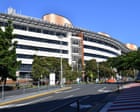Antimicrobial resistance threatens many of the gains of modern medicine, making even routine surgery much riskier. Some scientists believe phages, lurking in every corner of the planet, offer hope
Get our breaking news email, free app or daily news podcast
Humans have been visiting Merri Creek for millennia. The waterway snakes from Wallan, north of Melbourne, down through the suburban sprawl and flows into the Yarra River. The Wurundjeri, the traditional owners, once camped on Merri’s banks, dug up yam daisy and collected shellfish from the creek bed. When the Melbourne founder, John Batman, stumbled upon the creek in 1835, he scribbled a note in his diary describing it as a “lovely stream of water”.
Almost 185 years later, Trevor Lithgow, a biochemist at Monash University, and a student in his charge, visited that same lovely stream, bent down at its bank with an empty flask attached to a broom pole, and retrieved a double shot of water. They bundled the sample into a bag and drove it back to examine at their laboratory.








More Stories
Exercise ‘better than drugs’ to stop cancer returning after treatment, trial finds
New AI test can predict which men will benefit from prostate cancer drug
Elon Musk shows he still has the White House’s ear on Trump’s Middle East trip